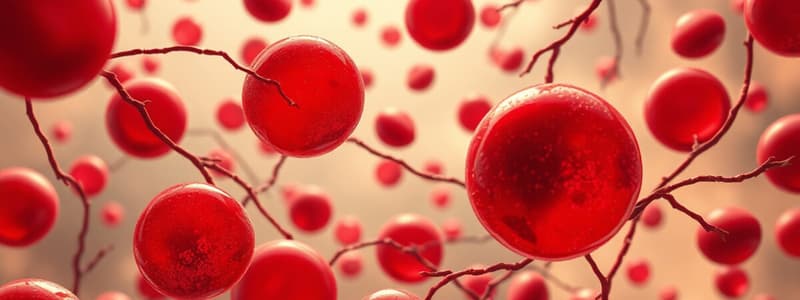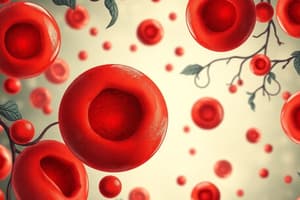Podcast
Questions and Answers
What is the primary reason manual RBC counts are rarely performed?
What is the primary reason manual RBC counts are rarely performed?
- They are often inaccurate and unnecessary. (correct)
- They do not provide a full blood analysis.
- They require extensive training.
- They are too time-consuming.
Which type of pathway is the Embden-Meyerhof Pathway?
Which type of pathway is the Embden-Meyerhof Pathway?
- A non-oxidative, anaerobic pathway. (correct)
- An aerobic, oxidative pathway.
- An anaerobic, oxidative pathway.
- A non-oxidative, aerobic pathway.
What is a potential outcome of pyruvate kinase deficiency?
What is a potential outcome of pyruvate kinase deficiency?
- Improved aerobic metabolism.
- Hereditary nonspherocytic hemolytic anemia. (correct)
- Increased erythrocyte overproduction.
- Enhanced hemoglobin synthesis.
Which aspect of ATP utilization in RBCs is NOT accurate?
Which aspect of ATP utilization in RBCs is NOT accurate?
Which statement about autohemolysis in PK deficiency is true?
Which statement about autohemolysis in PK deficiency is true?
What does the Hexose Monophosphate Shunt primarily produce?
What does the Hexose Monophosphate Shunt primarily produce?
Which of the following is a consequence of reduced glutathione in RBCs?
Which of the following is a consequence of reduced glutathione in RBCs?
What is the typical RBC count reference range for adult females?
What is the typical RBC count reference range for adult females?
Flashcards
Manual RBC count
Manual RBC count
A method for counting red blood cells, less accurate than automated methods and often unnecessary.
RBC count reference range
RBC count reference range
A typical range of red blood cell counts for different age groups & genders.
Embden-Meyerhof pathway
Embden-Meyerhof pathway
Key metabolic pathway in RBCs; handles most glucose for energy, producing ATP.
ATP in RBCs
ATP in RBCs
Signup and view all the flashcards
Pyruvate Kinase Deficiency
Pyruvate Kinase Deficiency
Signup and view all the flashcards
Hexose Monophosphate Shunt
Hexose Monophosphate Shunt
Signup and view all the flashcards
NADPH
NADPH
Signup and view all the flashcards
Study Notes
Erythrocytes: RBC Count
- Manual RBC counts are less accurate and less necessary.
- Other tests, like microhematocrit and hemoglobin concentration, are more accurate.
- RBC counts, hemoglobin, and hematocrit are higher at higher altitudes.
- The difference is about 1g Hb/dL at 2km and 2g Hb/dL at 3km altitude.
- Reference ranges for RBC counts vary by age and sex.
RBC Metabolic Pathways: Embden-Meyerhof Pathway
- Glucose enters red blood cells without energy expenditure (via a transmembrane protein).
- Accounts for 90% of glucose utilization in red blood cells.
- It's a non-oxidative, anaerobic pathway.
- Produces two ATP molecules.
- ATP is used for maintaining cell shape, active transport, and modulating 2.3 BPG levels.
RBC Metabolic Pathways: Pyruvate Kinase Deficiency
- An autosomal recessive disorder.
- The most common enzyme deficiency in the EMP pathway causing hereditary nonspherocytic hemolytic anemia (HNSHA).
- Possible findings in a blood smear include acanthocytes/thorn cells/spur cells/burr cells.
- Tests associated with PK deficiency:
- PK fluorescent spot test
- Autohemolysis test
- Quantitative PK assay.
- A screening test for PK deficiency to get a confirmatory test.
- Pattern of autohemolysis associated with PK deficiency:
- Autohemolysis is increased, but ATP corrects the hemolysis. (This is Type II)
Glycolysis Diversion Pathways: Hexose Monophosphate Shunt
- Also known as the pentose phosphate pathway or phosphogluconate pathway.
- Converts glucose to pentose and produces NADPH.
- NADPH reduces glutathione (which reduces peroxides, protecting proteins, fats, and heme iron from oxidative damage).
Studying That Suits You
Use AI to generate personalized quizzes and flashcards to suit your learning preferences.




